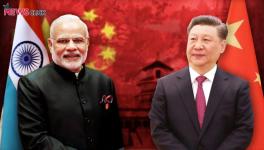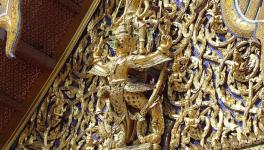Coup Attempt in Jordan Leaves a Trail
“What happens in the Middle East has a way of making itself felt everywhere around the world,” Jordan’s King Abdullah II ibn Al-Hussein while addressing the European Parliament, Strasbourg, 15th January 2021
A coup attempt is an orphan unless it succeeds. Therefore, all we can say is that a coup was in the making in Jordan. In a televised news conference on Sunday in Amman, all that Deputy Prime Minister Ayman al-Safadi would admit was that “These were efforts that threatened Jordan’s security and stability, and these efforts were foiled.”
He disclosed that “extensive investigations carried out by Jordan’s security forces” concluded that Hamzeh, the half brother of King Abdullah II; Sharif Hasan, a member of the royal family and Bassem Awadullah, a former senior official in the royal court and special Jordanian representative to the Saudi government, had engaged in activities that amounted to “promoting sedition.”
Safadi added, “The investigations had monitored interferences and communications with foreign parties over the right timing to destabilise Jordan.” He went on to drop a bombshell that the activities included cultivating relationships with members of the Jordanian opposition abroad and there was also evidence of a person with foreign ties offering services to Hamzeh’s wife, including the immediate use of a private jet to leave Jordan. (That person has since been identified as an Israeli.)
The regional reactions are rather illuminating. Qatar, Turkey and Iran reacted swiftly by supporting Jordan’s stability (here, here and here). King Salman of Saudi Arabia and Crown Prince Mohammed bin Salman reached out to King Abdullah of Jordan. Interestingly, Saudi establishment daily Asharq Al-Awsat highlighted that the “Arab world threw its support behind King Abdullah II and the measures taken to preserve Jordan’s security and stability.”
The daily listed out the reactions of the Arab world — Egypt, Oman, Bahrain, Lebanon, Kuwait, Qatar, Yemen, Palestine, Morocco, and the secretary-generals of Arab League and GCC. But it left out one country — the UAE. Of course, in that part of the world, hints and innuendos matter. Saudi Arabia’s keenness to distance itself from what happened and the great concern for Jordan’s stability on the part of Qatar, Turkey and Iran on one side and the UAE’s reserve in comparison on the other side add up to something.
Turkey had once explicitly alleged that the coup attempt in 2016 to overthrow President Recep Erdogan’s government was stage-managed from the UAE. Turkey pointedly named Mohammed Dahlan, the ex-Fatah intelligence chief who used to be a key interlocutor for the CIA and Mossad and now lives in the UAE under state protection. Dahlan’s name will most certainly crop up up here too at some point. The point is, about 70 percent of Jordan’s population is of Palestinian origin and generally they are well integrated into Jordanian society. Leading Palestinian businessmen play a key role in the Jordanian economy.
What needs to be understood is that the Israeli Right has always dreamed about a “confederative solution” between a State of Palestine and the Kingdom of Jordan as the best way to prevent a two-state solution and to dump that idea in the dustbin of history. But the glaring reality happens to be that seven million Jews and five-and-a-half million Arabs live between the Sea and the River; a reality in which Palestinians keep demanding their national rights in opposition to Israeli occupation – rights that are being recognised by the entire world; and a geopolitical reality in which, given Israel’s size and economy, it will eternally remain highly dependent on the world, primarily the United States, unless a solution is found in Jordan.
Added to that, as the new American President Joe Biden revisits the Palestinian problem, there is indeed a new sense of urgency to conclusively bury the two-state solution formula.
Jordan is a geopolitical conundrum. One marvels how amidst such contradictions, it managed to survive at all. It dextrously presented itself all this while as the “bridge” between Israel and the Arab world and brilliantly succeeded in cultivating strong ties with several US administrations. Unfortunately, however, the Abraham Accords between Israel and the Arab counties has rendered obsolete that “bridge”.
Without doubt, Israel and the UAE would have been the winners if the coup in Amman had succeeded. King Abdullah had openly sparred with President Trump and Israeli Prime Minister Benjamin Netanyahu over the proposed Israeli plans to annex the West Bank and bypass the Palestinians in a bid for normalising Israeli ties with the rest of the Arab world.
Again, if the coup had succeeded, Jordan would have joined the UAE to normalise ties with Israel and a “confederate solution” to the Palestinian problem might have become a real possibility — especially with Dahlan, who enjoys wide networking with the Palestinian elites living in Jordan, as the kingmaker. (Read a riveting profile of Dahlan recently in Turkey’s Sabah newspaper titled Is Mohammed Dahlan Washington’s next Palestinian presidential candidate?)

Geopolitically, such a Jordan, co-opted into the Emirati-Israeli orbit, would have been a springboard for projection of power into Syria and Iraq (and beyond, to Turkey and Iran as well.) The UAE has already opened its embassy in Damascus and is in league with the Kurdish groups (who are of course no strangers to Israeli intelligence.) Thus, it is a hugely symbolic gesture that Abu Dhabi Crown Prince Mohammed bin Zayed received the Iraqi prime minister Mustafa Al-Kadhimi and his accompanying delegation at the presidential airport in the emirate on Sunday.
Al-Kadhimi, a former intelligence chief in the mould of Dahlan, is currently executing an American agenda to roll back Iran’s influence in Iraq. If he were to be a key interlocutor for the UAE sheikh, it is to Israel’s advantage. Al-Kadhimi’s visit to the UAE comes after his trip to Saudi Arabia last week, during which Riyadh said it would increase investments in Iraq by five-fold to $2.67 billion. Clearly, a “regime change” in Jordan at this juncture dovetails into the grand designs of the UAE and Israel for the remaking of the Muslim Middle East.
In a historical context, Jordanian nationalism was formed as both a pan-Arab (rather than state) identity and as a relationship between Arabs and family rulers (ie., the Hashemites) rather than just a relationship between citizens and a single, bordered state. Over time, in the past several decades, the Palestinian link would grow to symbolise an increasing source of tension in the attempts of modern Jordan to define its nationalism and fit it into the official concept of nationhood. The underlying predicament is that nationhood would not emerge without political cohesion.
That is why, the roots of nationalism in Jordan are critically dependent on stability and power. Abdullah formed personal networks that enmeshed disparate tribes to the monarchy via security and other institutions. Rania Al-Abdullah, the queen consort of Jordan. The daughter of a Palestinian couple, her father being from Tulkarm in the West Bank.
The bottom line is that the tense relations between Abdullah and Netanyahu “reflect two different security and political approaches in the Middle East,” as the Middle East Eye (MEE) wrote recently. Netanyahu feels insecure over President Biden’s intentions. On the other hand, it is expedient for his own political future if he panders to his far-right allies’ notions of a Greater Israel and full Israeli control over the eastern mountains of the Jordan Valley (which they believe are part of the biblical kingdoms of Judea and Samaria), the destruction of sacred Al-Aqsa mosque in East Jerusalem (which they believe is located where the Second Jewish Temple once stood and which they want to replace with a Third Jewish Temple) and so on. Read here an overview by the MEE titled Netanyahu vs King Abdullah: Israel and Jordan relationship hits low point.
Basically, Abdullah blocked Trump’s so-called “deal of the century” for a settlement of the Palestine problem in Israeli terms. But Netanyahu hit back by ramming through the Abraham Accords, circumventing the Palestinians and Jordan, showing thereby that he could make peace with Arab states directly. And Netanyahu has plans to annex two-thirds of the West Bank, including the Jordan Valley, an area rich in water and minerals — and sees Jordan as a solution for that. He must hurry since Biden may have other plans.
Courtesy: Indian Punchline
Get the latest reports & analysis with people's perspective on Protests, movements & deep analytical videos, discussions of the current affairs in your Telegram app. Subscribe to NewsClick's Telegram channel & get Real-Time updates on stories, as they get published on our website.
























